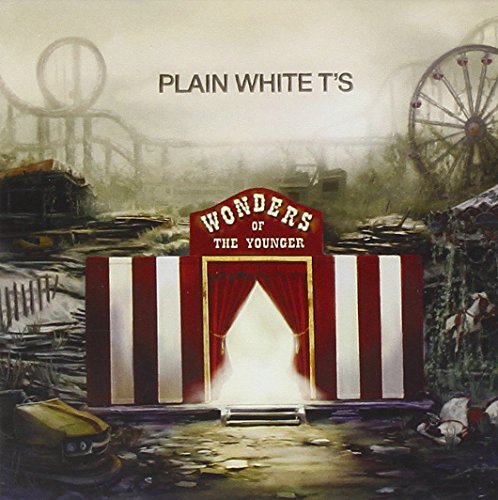
Plain White T's
Wonders of the Younger
Release Date: Dec 7, 2010
Genre(s): Pop/Rock
Record label: Hollywood
Music Critic Score
How the Music Critic Score works
Buy Wonders of the Younger from Amazon
Album Review: Wonders of the Younger by Plain White T's
Satisfactory, Based on 4 Critics
Based on rating 7/10
When Big Bad World hit stores in 2008, Plain White T’s were still reeling from the unexpected success of “Hey There Delilah.” To avoid being pigeonholed, they wound up steering clear of everything that made “Delilah” a hit, doing away with acoustic ballads and emphasizing loud, zippy pop songs instead. Released two years later, The Wonders of the Younger doesn’t have such a noticeable chip on its shoulder. Plain White T’s sound more comfortable this time around, never relying exclusively on the midtempo songwriting that made them famous but hardly shying away from it, either.
Based on rating 6/10
Consider us thoroughly killed with kindness For Plain White T’s, there could well be a remainder of the ‘Hey There Delilah’ backlash from 05 – some justified, a lot following the herd. So from opener ‘Irrational Anthem’, their sixth album is so unashamedly poppy and upbeat that it’s like they’re gleefully giving their finger to the haters. What this means is that if you find this band annoying, you’ll probably hate them 10 times more after hearing ‘Wonders Of The Younger’.
Based on rating C+
Chicago?s pop-punk nice guys haven?t tried for a full-on do-over of their 2007 smash ”Hey There Delilah,” but on Wonders of the Younger, they?re sticking with its delicate optimism, whimsically showcasing frontman Tom Higgenson?s images of love and life as a circus, pirate quest, and boomerang over orchestral ?60s rock. The idealism is admirable, but after an album of Bambi?s worldview via Beach Boys strings, you?ll want to put Higgenson down for a nap. C+ Download These:”Dust in the Wind”-esque Airplane at amazon.comBuoyant, bratty Irrational Anthem at amazon.com See all of this week’s reviews .
Based on rating 2.0/5
When adults who fancy themselves serious artists decide they want to say something about childhood, I expect contrivance. We were all kids once, but childhoods are the special, scare-quoted province of neurotics and their analysts, and so art about childhood is more likely to give a petulant prehistory of a specific adult's own issues than to say anything at all about what kids do or feel. Spike Jonze's improbably joyless Where the Wild Things Are was stuffed with scenes where kids and monsters rapped about their existential anxieties, while Arcade Fire is often at their least convincing when they wail about “the kids” or “us kids,” as though everyone under the age of majority belonged to one mysterious tribe.
'Wonders of the Younger'
is available now

